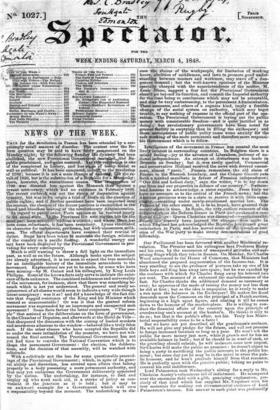NEWS OF THE WEEK.
_Titus far the revolution in France has been attended by a sur- prisingly small amount of disorder. The contest over the Re- -form question may he said to have fairly commenced on the Monday night; by the following Sunday tie dynasty had been abolished, the new Provisional Government .iustted,,ithe Re- public proclaimed, and-quiet restored. YO.ilits-renlutig,n is one of the completest in history, and has sigps jof being,lotial as well as political. It has been compared, inde4 to the revolution of 1789; because it is not a mere change of d,ynastt, 1,13 the re-
'volt of 1830, but is the substitwion of a Republic for a nirchy:
:there, however, the resemblance ceases. iiis of -1789 was directed less against the Monarch than against a tyrant aristocracy,. which bad no existence in February 1848; The recent outbreals was not the rising, of desperation against tyranny, but was in Its origin a trial of battle on the question of public rights ; and if fOrther questions have been imported into the contest, the absence of the fiercer passions is exemplified in the bland and bloodless biaring of the revolutionary Administration. In regard to publ*-- order, Paris appears to be. restored nearly to its usual state. e Provinces the new reel* hit fix the most parr, been acie-p.`fir-i1Uut a ejate.-1.; and where themjias been some reluctance it has been tranaitoey. Lyons vindielted., its character for turbulence, proforma, but with uncommon mild- ness. The official .departments have resumed their routine of- duties. Steps- have been taken to maintain the foreign relations of the country on a pacific footing. A wonderful energy and tact have been displayed by the Provisional Government in pro- vidino- for every contingency. •, Much is still wanting to throw a full light on the immediate past, as well as on the future. Although books upon the subject are already advertised, it is too soon.to expect the true materials for an intelligible history of the immediate antecedents to the movement. Explanations are yet to be made, by some who have been missing—by M. Guizot and his colleagues, by King Louis Philippe. Some of the known facts only serve to indicate the exist- ence of facts unknown. The combined suddenness and universality of the mbvement, for instance, show that there was something be- neath which is not yet understood. The general and ready as of all classes would seem to indicate a very wide though latent conspiracy: was it so? and did a knowledge of the fact dic- tate that dogged resistance of the King and his Minister which seemed so unaccountable ? Or was it that the genteel reform movement was superseded by an impromptu and unexpected mob movement? Some facts favour the latter conjecture. "The peo- ple" that assisted at the deliberations on the form of government, in the Chamber of Deputies, and afterwards at the Hotel de Ville— that sharpened the discussion with the aiming of loaded muskets and murderous allusions to the window—behaved like a truly felon mob. If the other classes who have accepted the Republic did so under the mere intimidation of the moment, we have not wit- nessed the final contest. The Provisional Government has not yet had time to convoke the National Convention which is to shape the permanent Government : the election, the delibera- tions, and the decision of that assembly, will be watched with solicitude.
With a solicitude not the less for some questionable proceed- ings of the Provisional Government ; which, in spite of its gene- ral ability and discretion, has entered upon affairs that belong properly to a body possessing a more permanent authority, and that may yet embarrass the Government deliberately appointed by 'the nation. The undertaking, for instance, to feed and employ av who need such aid, is a stroke of policy as con- venient at the juncture as it is bold ; but it may be an awkward example for a Government which will own a responsibility beyond the moment. The undertaking to die- cuss the claims of the workpeople for limitation of working hours, abolition of middlemen, and laws to promote good under- standing between masters and workmen, may stave off a dan- gerous demand ; but the well-known opinions of the Minister specially charged with the superintendence of the matter, M. Louis Blanc, suggest a fear lest the Provisional Government should go beyond its function, and commit the Imperial authority for the time being to conclusions which may not be acceptable, and may be very embarrassing, to the permanent Administration. These measures, and others of a cognate kind, imply a forcible change of the social system on authority, which may beget trouble, to say nothing of expense in the official part of the ope- ration. The Provisional Government is laying out the public money with considerable freedom—and is quite justified in so doing.; but revolutionary governments have been noted for greater facility in emptying than in filling the exchequer ; and these anticipations of public policy cause some anxiety for the safe working of the more permanent and therefore more responsi- ble Government which is to follow.


























